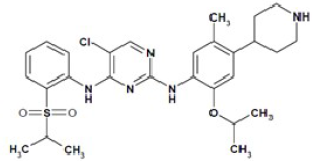Ceritinib

Zykadia is an anaplastic lymphoma kinase (ALK) tyrosine kinase inhibitor that blocks proteins that promote the development of cancerous cells. It is intended for patients with metastatic ALK-positive NSCLC who were previously treated with crizotinib, the only other approved ALK tyrosine kinase inhibitor.
How this drug is given:
-
Zykadia is a capsule, taken by mouth: the standard starting dose is 5 capsules, once daily. It should be taken on an empty stomach (do not eat for 2 hours before and 2 hours after your dose).
-
Take Zykadia exactly as prescribed.
-
Swallow Zykadia capsules whole. Do not crush, dissolve or open capsules.
-
Do not change your dose or stop Zykadia unless your health care provider tells you to.
-
If you miss a dose, take it as soon as you remember. If your next dose is due within 12 hours, then skip the missed dose. Take the next dose at the regular time.
-
Do not take more than 1 dose of Zykadia at one time. Call your health care provider right away if you take too much.
-
You should not drink grapefruit juice or eat grapefruit during your treatment with Zykadia. It may make the amount of Zykadia in your blood increase to a harmful level.
-
The amount of Zykadia that you will receive depends on many factors, your general health or other health problems, and the type of cancer or condition being treated.
Ceritinib is a kinase inhibitor. Targets of ceritinib inhibition identified in either biochemical or cellular assays at clinically relevant concentrations include ALK, insulin-like growth factor 1 receptor (IGF-1R), insulin receptor (InsR), and ROS1. Among these, ceritinib is most active against ALK. Ceritinib inhibited autophosphorylation of ALK, ALK-mediated phosphorylation of the downstream signaling protein STAT3, and proliferation of ALK-dependent cancer cells in in vitro and in vivo assays. Ceritinib inhibited the in vitro proliferation of cell lines expressing EML4-ALK and NPM-ALK fusion proteins and demonstrated dose-dependent inhibition of EML4-ALK-positive NSCLC xenograft growth in mice and rats. Ceritinib exhibited dose-dependent anti-tumor activity in mice bearing EML4-ALK-positive NSCLC xenografts with demonstrated resistance to crizotinib, at concentrations within a clinically relevant range.
The following side effects are common (occurring in greater than 30%) for patients taking Zykadia: diarrhea, hemoglobin decreased, increase in liver enzymes, nausea, vomiting, increase in creatinine, abdominal pain, fatigue, glucose increased, decrease in phosphate, and decreased appetite.
The following side effects are less common (occurring in about 10-29%) of patients receiving Zykadia: constipation, lipase increased, esophageal disorder (heart burn, dyspepsia, dysphagia), rash, and bilirubin (total) increased.
